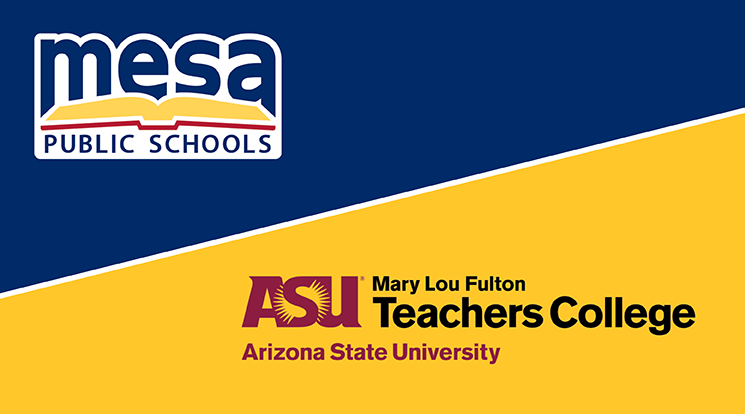Mesa Public Schools collaborates with ASU’s Mary Lou Fulton Teachers College to build leadership teams

Through a collaboration with Mesa Public Schools (MPS), Arizona State University’s Mary Lou Fulton Teachers College is offering its master’s and doctoral educational leadership programs in a customized format for cohorts of district faculty and staff.
“Our public education system is the cornerstone of our society, providing access and opportunity to a diverse range of students, and yet it must continuously evolve to better serve our communities,” says Randy Mahlerwein, assistant superintendent at Mesa Public Schools. “Creating the leadership teams of the future today is key to fulfilling that mission, and that means providing access to professional development opportunities that are grounded in research and practice.”
The two customized leadership-focused degrees being offered through MLFTC are: The Educational Leadership (Principalship), MEd, and the Leadership and Innovation, EdD, which offers an action research approach tailored to addressing systemic needs.
The offerings support the district’s efforts to build greater internal leadership capacity. They also complement what Mahlerwein describes as a district-wide effort to redesign education to support strong student outcomes and teacher retention, which includes team-based teaching models that are a focus of MLFTC’s nationwide and global Next Education Workforce initiative.
Master’s in Educational Leadership (Principalship):
About 40 MPS employees are either currently enrolled in, or are graduates of this master’s program. Features of these customized cohorts include:
- Conveniently located classes: MLFTC faculty hold courses at district locations.
- Team-teaching model integration: Mirroring the district’s emphasis on team teaching at the K–12 level, the master’s program offers classes taught in a team-teaching model that has included MPS leadership, such as Mahlerwein.
- Customized curriculum: The curriculum integrates case examples and topics relevant to MPS. Mahlerwein estimates that 10-15 percent of the curriculum has been specific to MPS experiences.
- District supports: Students fulfill internships by working with a district mentor who enables customized district supports and direct application to the work environment.
The first cohort of about 20 students recently completed their studies and most all of them have moved into a new leadership role within the organization, and at least six have been promoted, according to Mahlerwein. A second cohort of about 20 students will complete their studies in May, 2024.
Leadership and Innovation EdD
“There is a real demand and need for organizations to combine research with action,” says Josephine Marsh, associate director of MLFTC's doctoral (EdD) programs and associate professor. “When this is done as a cohort and part of an institutional project it is a powerful approach to work collectively on behalf of systemic change.”
Launched in 2023, the three-year customized cohort has about 20 students. Features of this cohorts include:
- Hybrid learning: Students take their courses remotely through a combination of scheduled weekly meeting times and learning that they do at their own pace via the asynchronous online format. MLFTC faculty also teach weekend in-person classes at the MPS campus.
- Customized curriculum: The curriculum is based on the theory and foundations of educational leadership, with an emphasis on the exploration of MPS models and case studies.
- Action research: The degree program is based on an action research approach that combines theoretical research with practical application on a current problem of practice project, or immediate need. The program, with its action research focus, has been recognized as a Program of the Year by the Carnegie Project on the Education Doctorate.
- Direct district application: Building on the program’s focus on action research, students will also contribute insight through their action research dissertation projects into the district’s approaches to innovation, including its emphasis on team teaching models.
“We see an opportunity for these EdD cohort participants to develop research that reflects valuable insight from their professional roles in ways that benefit their own career development as well as the district and communities we serve,” says Mahlerwein.
Supporting education leaders
Students in these cohorts at Arizona’s largest school district benefit from a designated MLFTC/ASU contact who works with a MPS counterpart to streamline communications and connect students with resources, such as MLFTC’s student success coaches.
MLFTC has developed other customized cohorts in coordination with the University of Guyana and Long Beach City College. The process of launching a cohort can be achieved within three to six months, and funding can come from a combination of tuition discounts, institutional funding and external donation sources.
Mahlerwein says that, for the district, the offerings are essential to supporting the future capacity of leadership teams across the board, with participants including teachers, assistant principals, principals, instructional leaders and coaches. “This all connects directly back to our focus on redesigning education in support of strengthening the teaching profession and supporting positive student outcomes,” he says.